- Home
- Glynnis Campbell
MacKenzie's Lass Page 2
MacKenzie's Lass Read online
Page 2
Until he gave her a smoldering head-to-toe perusal and a cocky smile, and then opened his brazen mouth.
“And I’ll have ye know I’m on my way to cook her dinner. The queen might be able to do quite well without the caterwaulin’ of a lass, but she’ll starve without my talents.”
Mery’s jaw dropped. Caterwauling? For once she was speechless.
He gave her a half chuckle and a dismissive wave. “Off ye go, lass.”
She would have cut him to ribbons with her tongue then—no matter how attractive he was—but the rest of the minstrels had just alit on the bridge. She didn’t want them to catch her in an altercation with one of the locals before they’d even been properly welcomed to Stirling.
So she sniffed and turned up her nose. Clutching her skirts in her fists, she stomped off across the bridge.
He was a cad to ruin her lovely mood. But she had more important things to think about. She consoled herself with the fact that if he was cooking the queen’s dinner, that meant he worked in the bowels of the castle kitchens. She’d likely never see him again.
Oblivious to her rattled mood, Harry, the leader of the minstrels, arrived beside her. “Mery, lass, slow down. Ye’ll miss all the best bits.”
Mery forced herself to an obedient amble as they made their way up the steep path to the castle. But she was so distracted by her incident with the cursed fisherman that she hardly glanced up when they entered through the long tunnel of the north gate.
Suddenly she was within the outer close of Stirling Castle, where there was a flurry of activity. All around her, people rushed to and fro. Armed soldiers marched past. Builders hammered on a wooden framework. Servants carrying baskets and jugs scurried from building to building. A woman herded geese past a cart piled high with cloth. A young mother carried a wee bairn on one hip and boughs of holly on the other. An old gentleman hobbled on a cane beside his trusty hound.
Anne the alto gave Mery a nudge of her elbow and pointed to the sculptures set into the alcoves on the exterior of the great hall. “Do ye see the cherubs? Some o’ them are musicians.”
“Aye,” Harry added, “and there’s the old king himself.” He nodded to a bearded statue at the upper corner of the building.
“Mm.” Mery nodded. But her mind was elsewhere.
How could her singing possibly scare fish? They didn’t even have ears, did they? It was nonsense.
Somehow amid the chaos, Mery managed to stay with the rest of the minstrels while Harry looked for the man in charge. Finally, they were invited to break their fast with bread and wine in the great hall.
Great hall was an understatement. It was the greatest hall Mery had ever seen. The room was enormous. Five fireplaces were necessary just to keep it warm. The arched ceiling of wooden beams rose above pale-colored walls slotted with large windows that let the light stream in. Tapestries depicting a unicorn hunt adorned the walls.
She wondered what the acoustics were like. In halls as large as this, the echo could either enhance the harmonies or distract the singers.
She longed to try out the sound, but now she was afraid to open her mouth. After all, she’d hate to frighten any more beasts.
The buttered bread offered to the minstrels was quite tasty, with a crispy crust and a soft middle. On the road, they usually had to make do with cheat bread made of coarse grain. But this was fine, white, fluffy manchet. She was certain the troll from under the bridge hadn’t made it. No one so rough-hewn could bake such refined bread.
After breakfast, they returned to the outer close. There they met the queen’s celebrated director of entertainment, Bastian Pagez. The Frenchman explained to them that they would be allowed to rehearse in the great hall later today. He said an English consort would be arriving on the morrow to accompany them for the banquet.
He went on to explain other tedious details. But Mery quickly tired of listening. She’d always had a busy mind. It was hard for her to focus on just one thing. Harry would fill her in on what she missed anyway.
She wondered what kind of fish they were having for dinner. She hoped it was trout. She liked trout, though she didn’t care much for pike, which was too bony, or bream, which had a muddy flavor.
She wondered which the queen preferred. Mery supposed she’d never know. It wasn’t likely they’d be singing for her tonight, since the festivities didn’t officially begin until the morrow. Besides, the queen probably dined alone in her chambers unless there was a…
Someone came striding across the courtyard, interrupting her thoughts.
It was him. The troll. He had a basket full of fish, and a fishing pole was slung over one brawny shoulder.
As if she’d called out to him, he turned his head toward her.
She glared at him.
He gave her a lazy grin and shook his head.
She must have made some sound to express her disgust then, for Pagez broke off abruptly and turned to her.
“You!” he snapped, clearly vexed by her inattention. “What is your name?”
She gulped. Though the troll was several yards away, she could still feel him staring at her as he slowed his step.
“Mery,” she choked out.
“Mery what?”
“Mery Graham, sir.”
“Well, Mery Graham, either you listen or you leave. I have no time for troublemakers.”
“Aye, sir.” Mery lowered her eyes.
The troll snorted in amusement and started to resume his travel.
Then Pagez turned on him as well. “You. Fisherman.”
Mery looked up. A muscle ticked in the man’s cheek.
“I’m not a fisherman,” he grumbled. “I’m a cook.”
“Even better.” Pagez stroked his chin. “Put down the basket. Let me look at you.”
Mery fought back a giggle.
The cook’s eyes narrowed to angry slits as he complied. But of course, he wouldn’t dare contradict the infamous Bastian Pagez, who answered directly to the queen.
“Turn around,” Pagez said.
He did so reluctantly.
Mery decided the man’s back side looked as fit as his front side. Apparently, so did Pagez.
“Perfect,” he said. “You will serve as the lead satyr for the entertainment. I’m certain the master cook can spare you.”
When she saw the displeased shock on the cook’s face, Mery had to bite her lip to keep from bursting into laughter. It served him right, she figured, for being so rude to her this morn.
Tristan fumed all the way across the courtyard.
This was why he preferred the safe haven of the kitchens. Nobody ever bothered him while he lurked in the dim depths of the underground warren. Nobody even noticed him.
Now, because of that irksome lass, the queen’s man had singled him out to perform for the court as a—what was it? The lead satyr? What the hell was a satyr?
Once in the roasting room, he propped the fishing pole against the wall and heaved the basket of fish onto the heavy table.
“Murray!” he barked. “Come clean these trout.”
Then he hung up his cloak and glanced at the fire to make sure Easson was still awake and turning the spit.
Tristan thought again about the woman on the bridge. To be fair, it wasn’t the fish who’d been disturbed by her voice. It was him. She’d completely ruined his focus with her beautiful singing. He didn’t know what she was singing about. It was something in a foreign language. But it was as compelling—and distracting—as the song of a Siren.
Peering up at her from the firth, he’d been startled to discover the lass was just as beautiful as she sounded. And that was even more disconcerting.
Her hair was the color of dark, wild honey, and her skin was custard-smooth. Her lips reminded him of a rosy, ripe peach. Her wide, expressive eyes were as mysterious and complex as French wine. And her body…
A tight-laced stomacher circled her waist, pushing up her modest breasts until they looked like two small, perfect loaves of br
ead…soft, tender, delicious.
At the memory, he let out his breath on a low whistle.
Just like cooking, fishing was an activity that required concentration, and the winsome lass had destroyed his.
Tristan felt less rattled now—now that he was in his element. The kitchens were a man’s domain. Life was simpler when no women were underfoot—women like that troublemaking Mery Graham.
In the male world of the kitchens, he could swear. He could sweat. Hell, he could take off his doublet if it got too hot.
Women complicated things.
It wasn’t that he disliked women. He adored them. In fact, he owed his current position to a woman—his mother. After Tristan’s father had been killed in the battle of Pinkie Cleugh, his mother—a French maidservant in the royal household—had landed Tristan the job of turnbrochie in the kitchens.
She’d worked tirelessly to make a life for herself and her six-year-old son. He’d worked his way up through the ranks of the kitchens, becoming a proper cook at eighteen.
It was his mother who’d convinced the master cook to let Tristan single-handedly prepare his first formal supper—a wedding feast at The Sheep Heid tavern in Musselborough—for two of the queen’s loyal subjects. And it was the success of that event that had earned him the respect of the master cook.
She’d finally worked herself into an early grave two years ago. But at least she’d remained alive long enough to see Tristan achieve a position of merit in the queen’s household.
“Good, ye’re back!” Thomas called out as he waddled into the room. “Have ye got the key to the spicery? The sparrows are stewin’, but we need saffron for the sauce.”
“Oh, aye,” Tristan said, digging in the small satchel tied beneath his doublet.
He placed the key in Thomas’s palm. Thomas handed him a chunk of barley bread.
“Eat, lad,” he urged. “Ye can’t cook a hearty meal on an empty stomach.”
Tristan nodded his thanks and dug in. The bread was still warm from the oven and so moist and smooth, it didn’t even need butter.
“By the way, we’re expectin’ a few stragglers for the late dinner,” said Thomas. “A troupe o’ players or somethin’—about a dozen extra mouths to feed.”
“Minstrels,” he grunted.
“Aye, that’s them. See them fed, will ye?”
Frankly, Tristan would rather not. He had no wish to cross paths with that troublemaking lass again, not after the fool Pagez had made of him.
But the master cook had his hands full, preparing supper for the rest of the castle folk. Thomas had more important things to do than serve the entertainers a late dinner.
“O’ course.” Tristan swallowed a bite of bread and was about to check on the custards when he had a sudden thought. “Oh, Thomas, tell me somethin’.”
“Aye?”
“What the devil is a satyr?”
Chapter 3
Three hours later, Tristan stood at the great kitchen table, surveying the leftovers that remained from the main dinner. He rather enjoyed the creative challenge of salvaging what was left to feed the servants. With over three hundred castle folk eating at every meal, there was rarely a shortage of surplus food. Why throw it away when it might fill an empty belly?
To his satisfaction, there was plenty here for the serving staff, as well as twelve or so minstrels. The last bit of roast goose could be combined with the leek and onion pottage. Stir in a handful of oats, boil it up, and it would become a tasty stew.
A few barley loaves remained in the bakehouse. He’d slice, butter, and sprinkle them with parsley. That, accompanied by cups of hearty beer, would provide a filling meal for the guests.
But there also remained an assortment of sauces, roast trout, a few untouched custards, sugared dates, and gingerbread. And it seemed a shame to waste perfectly good food.
At least that was what he told himself.
But the truth was he welcomed any opportunity to show off his cooking skills. And a wee part of him wanted to prove to that snobbish minstrel lass that he wasn’t—what had she called him?—a troll.
Damn it, she’d gotten the wrong impression of him. He was a highly respected cook, and he intended to prove it to her.
Rubbing his palms together, he reevaluated the table.
There were two decent-sized trout left. He could portion them out, season the filets with mace, cloves, pepper, and verjuice, enclose each serving within a quick pastry, and pop them in the bakehouse oven until they were golden and flaky.
If he crumbled the gingerbread into dishes, added a dollop of custard mixed with rosewater and chopped, sugared dates, then crowned the top with a drizzle of preserved orange syrup, he’d have a delicious sort of trifle to finish the meal.
He smiled in wicked satisfaction. By the end of dinner, he’d have that high-and-mighty Mery Graham eating out of the palm of his hand.
Mery drummed her fingers on the trestle table in the great hall. She was impatient to try out the sound of the cavernous chamber. But the minstrels had yet to sing a single note.
Bastian Pagez had spent the entire morning discussing every aspect of the next three days. Mery was thrilled to learn that the performers would be wearing costumes for the banquet on the final day. Everyone would be portraying some sort of mythical creature.
Mery was chosen to be a Nereid, one of Poseidon’s daughters. The Nereids had such beautiful voices that their singing could lure men to their death. It was the perfect part for her, especially because it proved that her voice most certainly did not scare fish.
Besides, it was far better than playing a stupid satyr.
She bit back a grin as she remembered the crestfallen expression on the cook’s face when he learned he was to be part of the spectacle. She’d almost felt sorry for him…almost.
After Pagez’s lecture, the minstrels had been guided to their lodgings along the main esplanade of Stirling. The fine stone house where they were to stay was three stories high. Their host, an old soldier with a steel leg, welcomed them into his wife’s spectacle shop on the ground floor. He then led them upstairs, past the middle floor, which featured a cozy hearth with comfortable seating and a modest kitchen. They were allowed to unpack their things in a pair of rooms on the top floor, which also housed at least six of the hosts’ bespectacled children.
Now the minstrels had returned up the long hill to the castle. Mery was ravenous. Her stomach growled as she sat with the others at the table in the great hall. The denizens of the castle had already supped, which wasn’t unusual. Minstrels and servants almost always ate before or after everyone else, since they normally sang during meals.
She didn’t expect much more than thin pottage. So it was a pleasant surprise when a steaming bowl of hearty stew and a thick slab of barley bread were placed before her.
“I hope ’tis to your likin’,” came a familiar voice.
Mery craned her head around. The cocksure rogue of a cook stood behind her. Her heart skipped a beat at the sight of him, to her exasperation. After all, he was too ridiculously handsome for a common cook. He’d cleaned up, buttoned his doublet, and put his hair in order. He looked almost civilized.
At least he did…until she met his wicked, glittering gaze. Though he addressed the whole company of minstrels, his eyes were fixed on her. Mischief sparkled in the bright blue orbs, as if he issued her a challenge.
And because Mery had never been able to resist a challenge, she returned his bold smile. She raised a spoonful of pottage, prepared to give him her ruthlessly honest opinion.
Then she tasted it.
Delicious didn’t begin to describe it. The vegetables were firm and flavorful, not boiled into oblivion, as was usually the case with stews. The bits of roast goose lent a smoky aroma to the dish. She tasted leeks, onions, parsley, and pepper—strong, but not overpowering. Mery closed her eyes to relish the flavor.
She wasn’t the only one impressed. All around her, the minstrels oohed and ahhed over the r
ich stew.
Harry was the first to speak. “Give my compliments to the cook, lad. I believe this is the best pottage I’ve ever had.”
“Thank ye,” the cook replied with a nod of his head.
Anne the alto gasped. “Faith, did ye make this?” she asked.
“I did.”
“Well, ’tis superb. Isn’t it superb, Brian?”
Brian the tenor nodded his head. “Mmm.”
Davy the bass chimed in. “And the barley bread! ’Tis as soft and supple as a harlot’s—”
“Davy!” chided Isabel, the other alto.
Davy grinned.
He was right about the barley bread. It was divine.
But Mery wasn’t much inclined to rave over the cooking of a man who’d insulted her singing, no matter how handsome he was.
Still, it didn’t keep her from eating every last crumb.
“And for the next course…” the cook announced.
The minstrels gave a collective gasp of pleasure. They were unaccustomed to being served more than one course.
The cook continued with a smile. “La truite en croûte.” He bent down slightly, murmuring for her benefit, as if she couldn’t speak French perfectly well, “Trout in a crust.”
She stiffened. “I ken what it is.” She resisted adding that apparently her singing hadn’t scared away the trout after all.
While everyone carried on over the darling little flaky golden pouches filled with trout, Mery tried not to enjoy the rest of her pottage.
She meant to leave her truite en croûte untouched. The last thing she wanted to do was to reward the efforts of the swaggering lout of a cook.
Unfortunately, she was still hungry. So while he wasn’t looking, she broke off a small piece and nibbled at it. It was quite good. The pastry was buttery and light.

 Bride of Fire
Bride of Fire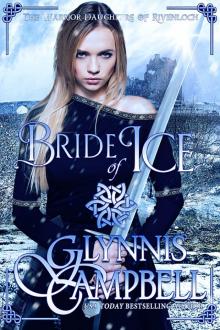 Bride of Ice
Bride of Ice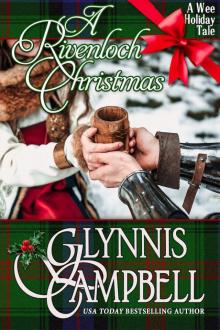 A Rivenloch Christmas
A Rivenloch Christmas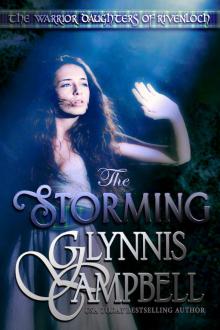 The Storming
The Storming Native Hawk (California Legends Book 3)
Native Hawk (California Legends Book 3)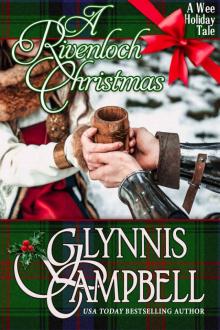 A Rivenloch Christmas: A Wee Holiday Tale (The Warrior Daughters of Rivenloch Book 0)
A Rivenloch Christmas: A Wee Holiday Tale (The Warrior Daughters of Rivenloch Book 0)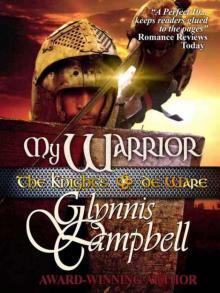 Knights of de Ware 02 - My Warrior
Knights of de Ware 02 - My Warrior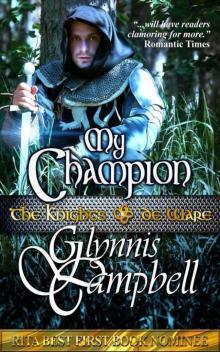 Knights of de Ware 01 - My Champion
Knights of de Ware 01 - My Champion The Shipwreck
The Shipwreck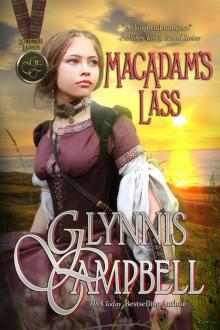 MacAdam's Lass
MacAdam's Lass Native Wolf
Native Wolf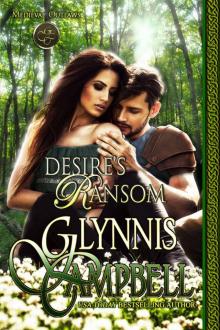 Desire's Ransom
Desire's Ransom Native Gold
Native Gold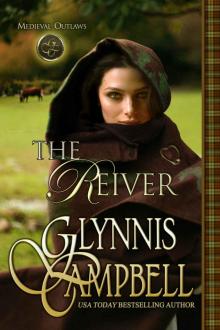 The Reiver
The Reiver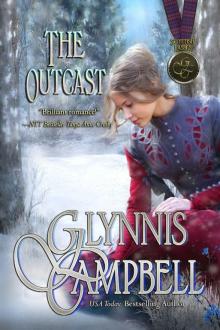 The Outcast
The Outcast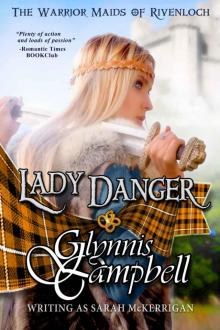 Lady Danger (The Warrior Maids of Rivenloch, Book 1)
Lady Danger (The Warrior Maids of Rivenloch, Book 1) A Yuletide Kiss
A Yuletide Kiss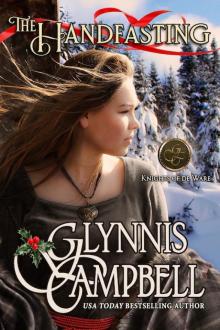 The Handfasting
The Handfasting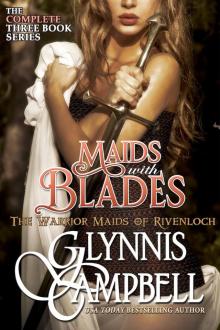 Maids with Blades
Maids with Blades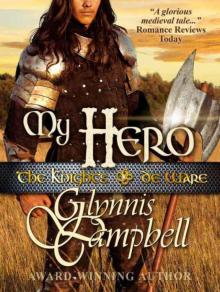 Knights of de Ware 03 - My Hero
Knights of de Ware 03 - My Hero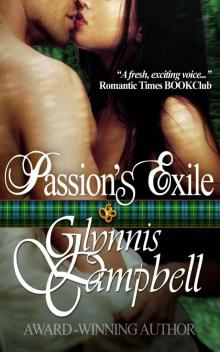 Passion's Exile
Passion's Exile Danger's Kiss
Danger's Kiss Highlanders for the Holidays: 4 Hot Scots
Highlanders for the Holidays: 4 Hot Scots